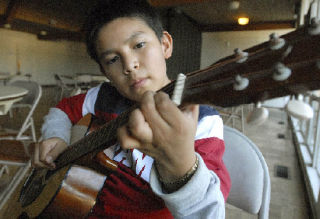She serves as a bridge for others.
And true to her name, Dianne Aid responds with a multi-faceted mission as a member of one of Auburn’s long established, caring congregations.
“I approach everything with joy,” Aid said from the confines of her office at St. Matthew Episcopal Church. “There is a lot of pain in the work I do. We see a lot of sadness.
“But for me personally, I feel so grateful that God has called me here to do this.”
Aid, a member of the Franciscan order, is a big-hearted liaison devoted to extending a helpful hand as coordinator of the parish’s Jubilee Center – a program of the church’s Spanish-speaking congregation, San Mateo.
She has been closely involved in Latino missionary work for many years and attached to the Episcopal Church for 30 years. When people need help she gets moving, helping others, linking cultures with agencies and social service systems as a community organizer.
She champions the cause and rights of a growing Hispanic community while working with the city to find arrangements and remedies. Her role is wide and varied. She connects people to what they need, shows them where they need to go and when they need to be there – whether that link involves housing or tutoring, obtaining legal counsel or pursuing other transition services.
Aid and her staff belong to a congregation that provides legal, financial and spiritual support, while advancing cultural awareness in the wake of immigration reform.
“It’s God’s calling to her,” said St. Matthew’s rector Susan Armer. “She is using her skills, experiences and talents to focus on what she is called to do.
“She learns everyday, and it’s not that she knows everything,” Armer added. “She has learned how to listen and how to access what people need.”
The church began a summer Bible school for children, then a homework program for Hispanic students, then English classes for adults. It also offered immigrants help negotiating the system – such as how to apply for a driver’s license and interpret a rental contract.
It has done more to recognize and promote a culture.
OUTLET FOR EXPRESSION
The Jubilee Center, for instance, recently became a stage for song and dance for the Purépecha, an indigenous Spanish-speaking people whose community extends throughout South King and North Pierce counties.
“We couldn’t do anything without her,” said Leobardo Mota, a musician who teaches guitar to others at the center. “She has provided us with hope, encouragement. She motivates me and cares for us.”
With Aid and her staff’s support, Mota has opened the hearts and ears of others in the community. The center has come to life with traditional Purépecha song and dance. It is all part of the center’s Orgullo Purépecha, a cultural enrichment program encouraging youth and all ages to discover their cultural roots.
“It is important that we hand that down to our younger generations,” Mota said.
Faith, community and culture were interwoven for Aid at an early age. That impression from the beginning continued throughout a career dedicated to helping others.
Some churches embrace those at risk in their communities. Others, like the Episcopal Church, joined the “New Sanctuary Movement” that spread across the country.
Patterned after the sanctuary movement of the 1980s, when churches sheltered Central and South Americans fleeing death squads and oppressive political regimes, the “new” movement claims churches and organizational support in many cities.
Auburn is among them. St. Matthew became one of the first churches in the Northwest to publicly join the movement.
Aid has been a catalyst behind the Hispanic community’s cause.
She follows an active schedule and refuses to slow down despite being confined to a wheelchair because of the effects of diabetes and a collapsed foot.
“It’s a community that’s on a journey,” she said. “It’s a community trying to find its niche in the face of hatred and racism.”
Aid understands very well that anti-immigration sentiment runs hot in the country. Hopefully, her work will ease those tensions while building community relationships.
The church continues to embrace the work. There is much more to be done, like opening business opportunities for the Hispanic community.
What’s important is acceptance, understanding and support in bringing all sides together.
“The biggest thing, though, is community organizing,” Aid said. “Whatever a congregation can do to begin to facilitate the (immigrant) community organizing itself is a help.
“There is a huge need to have the mainstream, English-speaking congregations involved in this because these are the folks who can really move the political process.”
St. Matthew began to embrace the immigrant community five years ago.
The Auburn area, including the neighborhood surrounding the church, had grown increasingly Hispanic.
Today, about a third of the 102-member church is of Hispanic origin.
“We’re building the plane as we are flying it,” Armer said of the evolving program. “We’re never really sure of what is being required next. We have a very intelligent, flexible program with the passion to really live into our baptismal covenant.
“We are dealing with people who really want to be contributing members of society, who really want to become deeply rooted here as they were in their home countries,” Armer added. “It’s an admirable, good thing to do.”
The program’s efforts have brought the community and city closer together, Armer observed.
“We’re very blessed in this particular city with that kind of forward-looking openness,” she said. “The city of Auburn has had a very inclusive outlook. It’s an excellent model … to really try and bring all the citizens together.”


